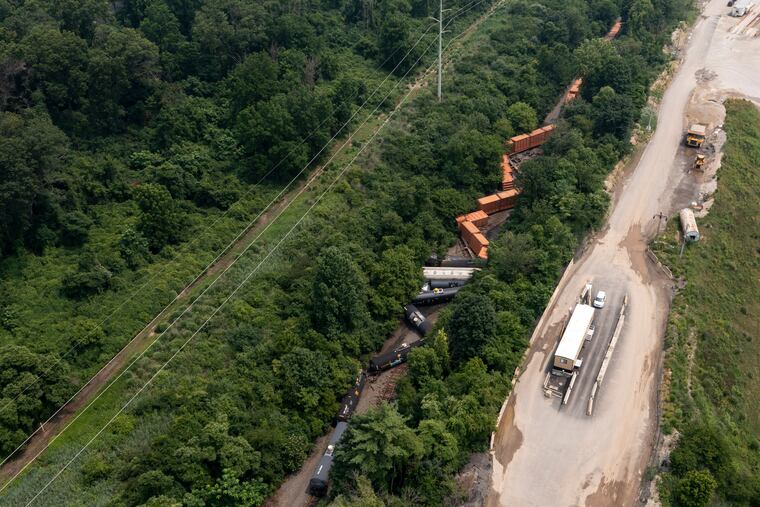Whitemarsh train derailment spilled plastic pellets but no toxic chemicals. No injuries were reported.
The Federal Railroad Administration is investigating the early-morning derailment.

Fifteen cars of a westbound CSX freight train derailed shortly before 5 a.m. Monday in the Montgomery County township of Whitemarsh, prompting the evacuation of 12 homes, road closures, and mobilization of a hazmat crew.
A huge pile of plastic pellets spilled to the ground from a tear in a 190,000-pound hopper car, officials said, but the pellets posed no danger to residents. No other substances leaked, local police and fire commanders said.
Officials said that the 40-car train, operated by CSX on a line owned by Norfolk Southern, was also carrying urea, a fertilizer that can be used to make plastic products, and tetrachloroethylene, an industrial degreaser that is also used in dry cleaning.
According to the Centers for Disease Control and Prevention, tetrachloroethylene can irritate the eyes, skin, and respiratory system when breathed at high concentrations. Animal studies show the chemical may cause liver and kidney damage, but it’s unclear what that means for humans.
Officials described the substance as “potentially toxic” but added that the car carrying it was not leaking following the derailment.
“Everything is contained in the car, but it is sitting not like it normally would,” said Ben Russell, emergency response program coordinator with the Pennsylvania Department of Environmental Protection. “That’s why we’re obviously watching the handling of it.”
The evacuation order affecting a dozen Whitemarsh Township homes near the derailment site was lifted just before 9:30 a.m., said Chris Schwartz, fire chief of Barren Hill Fire Company.
As of late morning Monday, the area had been turned over to Norfolk Southern and CSX to continue mitigation efforts and to begin the cleanup, Schwartz said.
Recovery crews will be using the nearby quarry, owned by Highway Materials, as an access point and staging area for heavy equipment, Whitemarsh Township Police Chief Christopher Ward said, which will allow recovery to continue without impacting traffic patterns.
“There will be, we believe, limited impact on our highways and our residents as they do the recovery of the train,” Ward said.
The cause of the derailment was not known. Early in the day, the Federal Railroad Administration (FRA) sent a team to the site to begin an investigation.
The FRA is the chief regulatory agency for the nation’s freight and passenger railroads and conducts investigations under its own authority. It also enforces federal rules for railroad operation.
The National Transportation Safety Board, on other hand, is an independent federal agency that typically launches investigations of the most serious and catastrophic transportation mishaps: rail, air, sea and highway crashes, as well as pipeline safety. The NTSB is investigating the recent I-95 fire and bridge collapse in Philadelphia.
Given the number of highly publicized train derailments in the last 18 months, communities should treat train crashes like Whitemarsh’s as “a series of wake-up calls, not as isolated incidents,” said Mathy Stanislaus, a vice provost and executive director of the Environmental Collaboratory at Drexel University.
» READ MORE: After Whitemarsh train crash, it’s imperative officials look at the bigger picture, says Drexel environmental expert
Derailments are more common than people might think, though most cause minor damage and happen at low speeds in rail yards and on other railroad property. In 2022, 1,211 derailments were reported to the FRA’s Office of Safety Analysis, as required. That was about 7% higher than in 2021. But derailments dropped 8% from 2013 through 2022.
It’s worth studying the effect climate change and extreme weather can have on rail transport, Stanislaus said. “If you’re going to protect communities, you’re going to take a hard look about how to project the risk going into the future.”
For people working in the area, the morning commute came at a slight inconvenience because of detours, but the derailment was before dawn.
Staff at William Jeanes Memorial Library on Joshua Road said it was easy enough to get to work, and the library was open for business. Sunnybrook Golf Club didn’t open until noon Monday, and staff there said the early-afternoon trade was typical — golfers tend to be on vacation or squeeze some holes late in the afternoon this time of year.
Staff writers Ximena Conde, Aubrey Whelan, and Nick Vadala contributed to this article.